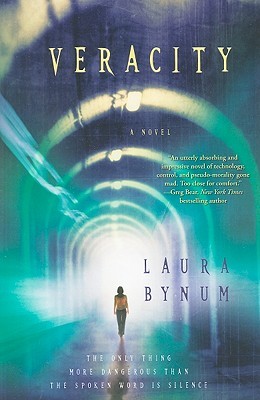Harper Adams was six years old in 2012 when an act of viral terrorism wiped out one-half of the country's population. Out of the ashes rose a new government, the Confederation of the Willing, dedicated to maintaining order at any cost. The populace is controlled via government-sanctioned sex and drugs, a brutal police force known as the Blue Coats, and a device called the slate, a mandatory implant that monitors every word a person speaks. To utter a Red-Listed, forbidden word is to risk physical punishment or even death.
But there are those who resist. Guided by the fabled "Book of Noah," they are determined to shake the people from their apathy and ignorance, and are prepared to start a war in the name of freedom. The newest member of this resistance is Harper -- a woman driven by memories of a daughter lost, a daughter whose very name was erased by the Red List. And she possesses a power that could make her the underground warriors' ultimate weapon -- or the instrument of their destruction. (Goodreads)
How about a normal ol' book review for today? It's been a while :)
So, this was a random pick for me to nab, as I don't generally read a whole lot of adult dystopian. Maybe that's because it can often depress me, or just make me angry (at the world in the book, not in general!). But, something about this made me curious--mainly the fact that the world is basically erasing words from the inhabitants. Shrinking their vocabulary down to the sparsest necessities. This drives home the fascinating fact that words are powerful, and that knowing a word with its accompanying concept is vital for freedom. I really enjoyed that concept and the way it was handled by the author. The story itself was okay--not great, but engaging enough to keep me going. Harper's naivete and weakness throughout most of the story, despite the opening where she seems incredibly driven and motivated, was a bit frustrating (although probably more honest in how a woman in that predicament might really act). The romance line was tossed in a little haphazardly and I wish it had been fleshed out more, as I think it would have benefitted Harper's characterization.
Another thing that I kept circling back to while reading this, and a topic that I've thought about before with other novels set in a post-pandemic world, is the loss of population base. We live in a world that needs a whole lot of people doing lots of little things to keep the whole operation moving. To lose them, or in this novel's case, to indiscriminately kill off wide swaths of people, means losing a great deal of infrastructure and ability to maintain many systems. This result was not really addressed at all, other than there being areas that were mostly uninhabited. Anyhow, what it boils down to is that in a world where there are fewer people, I honestly don't think killing off your enemies is the way people would go about keeping the population in line. There are definitely fates worse than death, and that's fearful enough, and then you still have working hands to keep things running. I don't know, just something random I was ruminating on :)
Do you have a favorite dystopian novel?
The blog home of Meradeth Houston, author of COLORS LIKE MEMORIES, THE CHEMISTRY OF FATE, SURRENDER THE SKY, AN ABSENCE OF LIGHT, TRAVELERS, SOMEONE ELSE'S SOUL, and THE COINCIDENCE MAKERS!


That sounds seriously dystopian! Good review.
ReplyDeleteGreat review, looks like a good book.
ReplyDeleteThis sounds like a fascinating book. Words are so powerful- so I am intrigued by the plot. Thanks for sharing. :)
ReplyDelete~Jess